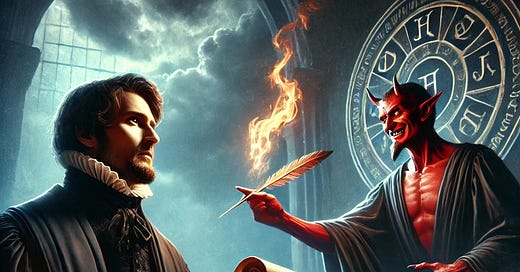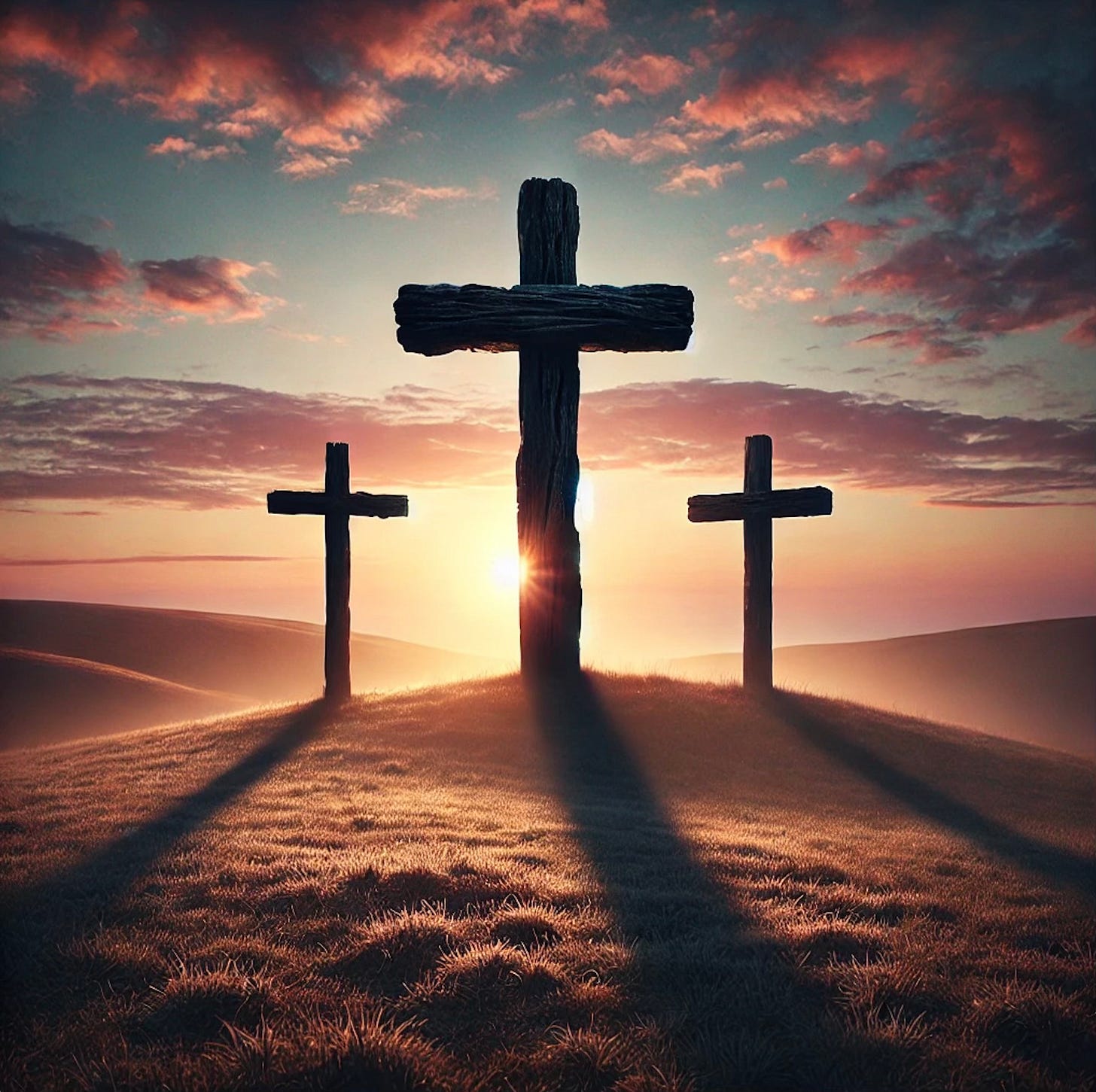We cannot become acclimated to the stench of tyranny, no matter how often it drifts through the air disguised as strength, order, or tradition. Authoritarianism is not merely a political danger; it is a spiritual crisis that reshapes our desires, numbs our conscience, and distorts our imagination. In my last post, I named this rising tide as a summons to faithful resistance. In this one, I want to go deeper, beneath the noise of politics and into the spirit of the age itself. What grips us now is not just a shift in governance, but a Faustian bargain: the surrender of soul for control, of presence for power, of truth for domination.
"Do not be conformed to this age, but be transformed by the renewing of the mind, so that you may discern what is the will of God, what is good and acceptable and perfect." — Romans 12:2 (NRSV Updated, emphasis mine)
At certain moments in history, the pressure to conform becomes almost irresistible. When the forces shaping our culture grow pervasive, conformity can feel inevitable. Paul’s invitation in Romans 12:2 speaks directly to moments like these, calling us not merely to personal renewal but to spiritual resistance. To reject conformity to this age (aion) is to actively resist patterns of domination that distort our humanity.
Walter Wink powerfully names these patterns the Domination System, an interconnected web of spiritual, cultural, and political forces described in Scripture by the terms aion (age), kosmos (world), and sarx (flesh). These aren't just abstract ideas, they're the stories we believe, the air we breathe, the desires we nurture. The Powers gain strength when they remain hidden. But Scripture calls us to identify, expose, and resist them.
To be “conformed to this age” is to fall under the spell of what Wink calls the Domination Epoch, a time when empire shapes our imagination through fear, cynicism, and manipulation rather than love and justice. But the way of Jesus offers a different path: inner renewal, outer resistance, and Spirit-empowered discernment.
This is precisely the path we need in the winter we now face.
The Powers Shape Epochs
The Powers do not merely shape individuals, they shape epochs. Some seasons, like ours, are more contested than others. Wink describes aion as a spirit-laden time, a spiritually charged era that carries both pressure and potential. This resonates with what William Strauss and Neil Howe describe in The Fourth Turning. According to their framework, we’re not in ordinary times, we’re in winter: a time of unraveling, reckoning, and re-formation. Systems are cracking, and the center no longer holds. In such moments, the temptation to conform intensifies: to seek control, cling to false saviors, or give in to despair. Yet these seasons also carry the potential for something new, if we have eyes to see and the courage to respond.
The Fourth Turning and the Winter We’re In
Just before the pandemic, I read The Fourth Turning: An American Prophecy - What the Cycles of History Tell Us About America’s Next Rendezvous with Destiny by William Strauss and Neil Howe, two authors known for their work on generational theory. Strauss, a Harvard-trained historian, playwright, and theater director, and Howe, a Berkeley and Yale-educated historian, economist, and demographer, offer a striking view of history that felt eerily relevant in early 2020.
Though written in 1997, the book seemed to describe our exact moment. It became clear to me that Covid was only the beginning, that if this historical pattern held true, the most intense part of winter was still to come.
Strauss and Howe reject the myth of linear progress and instead propose a cyclical view of history, with 80–100-year cycles made up of four “turnings”:
The High: A period of strong institutions and civic optimism (e.g., post-WWII America). This is spring, a time of growth and construction.
The Awakening: A time of spiritual questioning and cultural upheaval (e.g., the 1960s–70s). Summer brings ferment, from the hippie movement to the Jesus Movement, and earlier, the First and Second Great Awakenings.
The Unraveling: An era of individualism, culture wars, and weakening institutions (e.g., the 1980s–90s). This is fall.
The Crisis: A decisive period of upheaval when the old order collapses and a new one emerges (2005–2030). Previous crises include the Great Depression and World War II, the Civil War, and the American Revolution.
These turnings mirror the seasons of the year. The current Fourth Turning, marked by crisis, or winter, began around 2005, with the 2008 financial collapse signaling its visible onset. In these winters, societal systems unravel. Class, race, and national identities collide. As existential stakes rise, so too does the public’s willingness to trade personal freedoms for the promise of order.
Fourth Turnings are times of extreme upheaval, civil unrest, institutional collapse, and the potential rise of strong centralized authority. The very survival of the nation will feel at stake. Each cycle sharpens both the tools of destruction and the temptation to wield them.
We are in winter now. It may be long and difficult or brief and severe, but like all winters, it cannot be avoided. The Domination System’s grip is tightening. Yet how we respond will shape the world that follows.
A Church in Transition – The 500-Year Rummage Sale
While Strauss and Howe chart shorter cycles, Phyllis Tickle zooms out to broader 500-year intervals in her book The Great Emergence. She argues that the Church undergoes major transitions roughly every five centuries, reassessing her beliefs, practices, and structures, and that we are in the midst of one now:
1st Century: The Great Transformation - Christianity emerges from Judaism.
6th Century: The Fall of Rome and rise of Monasticism - faith is preserved amid social collapse.
11th Century: The Great Schism - East and West divide.
16th Century: The Protestant Reformation.
Now, in the 21st century, we live in what Tickle calls The Great Emergence, a time of questioning authority, integrating new technologies, and redefining how faith is expressed. These changes affect not just Protestantism but all branches of Christianity, and even other world religions.
Tickle suggests this isn’t merely a period of deconstruction, but a Spirit-led opportunity to reimagine. We’re not just living through a Fourth Turning, we’re in a moment even more significant. The Spirit is stirring something new. But the spirit of the age seeks to trap us in idolatry, comfort, or digital escape.
Can we discern God’s pruning from the pressure of the Powers?
Faust and the Soul of the West
One of the most gripping visions of history I’ve encountered comes from Oswald Spengler, a German thinker writing in the shadow of World War I. In his sprawling, philosophical, and mythical book The Decline of the West, Spengler argued that civilizations are not machines of progress but living organisms, with a soul, a cultural spirit that is born, matures, and eventually fades, typically over the span of about a thousand years.
He called the soul of Western civilization "Faustian."
In the old legend, Faust makes a pact with the devil, trading his soul for limitless knowledge and worldly power. For Spengler, that same restless hunger defines the West. We built empires through colonial conquest, carved borders across continents, and called it destiny. We raise cathedrals that reach for the infinite, split atoms and scan galaxies, digitize every inch of life and call it progress. We chase control as if it were salvation.
But in our striving, Spengler says, we lose something essential. Culture gives way to machinery. Wonder is replaced by technique. The soul that once dreamed begins to die. We stop creating and start copying. Cities swell into impersonal empires. Democracies hollow out, as wealth quietly takes the reins. Leaders no longer serve the common good, they serve the highest bidder. Power becomes the point.
Spengler didn’t believe this was something we could fix. For him, it was simply the season we’re in, Winter. The last phase. The end of the West’s long arc. Even religion, he believed, becomes hollowed out in times like these, more institution than inspiration, a fading echo of the soul it once nourished.
Though some have twisted his ideas to serve dark agendas, Spengler simply looked at history and saw repeating patterns: ambition turning into exhaustion, freedom into control. Even in naming decline, he wasn’t counseling surrender. He saw himself as a realist, sounding the alarm, inviting readers to meet the moment with clarity, not comfort.
And yes, his vision is hauntingly accurate: the rise of strongmen, the collapse of truth into spin, the way modern life shrinks our souls even as it expands our reach.
Resurrection as Resistance
But for all his brilliance, Spengler missed one thing:
Resurrection.
Where he saw decline as destiny, we see something deeper. We follow a Savior who let history do its worst to him, and still rose from the grave. So even now, in this winter season, we resist despair. We reject the Faustian spirit that would trade soul for comfort, presence for power, truth for control.
Because the gospel tells a different story. One where love outlasts power. One where death is not the end. One where the people of God dare to hope, even in the cold.
Resurrection still speaks.
We are not here to save the West.
Not if saving means clinging to its dominance or baptizing its myths. But we do believe in its redemption, not in preserving what must die, but in calling it back to life.
As Walter Wink reminds us, the principalities and powers were created good, corrupted by idolatry, and yet still redeemable. The West, too, was given a vocation: to serve life, to protect the vulnerable, to seek justice and beauty and truth. That calling has been distorted, but not erased.
So we do not abandon it to collapse. We stand within it, bearing witness. We confront its idols not to destroy, but to heal. We call it to repent, to return, to remember who it was meant to be.
The gospel does not exist to serve empire, it exists to renew creation. And that includes nations, cultures, systems, and stories. Resurrection is not escape, it is transformation. It is the call to live again.
Let what must die, die.
But let what can be redeemed, rise.
We are not afraid.
We will not trade our souls when we’re called to redeem the time. We will not accept domination as the price of peace. We will not let the gospel be twisted into propaganda.
Instead, we will live as midwives of redemption,
calling forth life in the ruins,
speaking hope into despair,
and believing that even now, God is at work.
And we will not trade our souls.
This is not the time to give up.
It is the time to rise up, with courage, clarity, and a fierce hope that refuses to die.
We were born for faithful resistance
God has placed us here with purpose. To live faithfully in this age, we must:
Identify and resist the Powers distorting our humanity.
Cultivate prophetic imagination for the renewal of the Church.
Engage in protest, neighborhood care, and solidarity with the marginalized.
Embody Jesus’ hope in contested spaces.
Develop contemplative resilience for the long road ahead.
Faithful resistance is how we stay human in an inhuman age.
Join Daniel, Jessie, and me for this free V3 Webinar. You can register here.
Discerning the Spirit of the Age
Where is the Faustian spirit misshaping my desires?
How is conformity to the spirit of the age influencing my community?
What dysfunctional church planting narratives has this spirit produced?
What practices are grounding me in the way of Jesus?
Looking Ahead
If Faust represents the soul of the West, restless, ambitious, and enthralled by control, then we must ask: what systems now carry that spirit forward? In the coming weeks, we’ll examine how the Faustian drive has been institutionalized through technocratic and oligarchic power. Faithful resistance begins with naming the spirit of the age, but it must go deeper, into practices of discernment, presence, and embodied witness. Together, we’ll explore how to resist with clarity, courage, and love.
The Engine of Autocracy: Technocrats, Oligarchs, and the New Architecture of Control
Beneath every strongman lies a system. This post will explore how technocracy and oligarchy are building a new infrastructure of domination, one that demands spiritual discernment and faithful resistance that transcends partisan lines.Faithful Unto Death: Óscar Romero’s Witness Against the Alliance of Wealth and Power
Through the life and martyrdom of Óscar Romero, we’ll consider what it means to follow Jesus in the face of state violence and elite control. Romero offers more than inspiration, he embodies a vision of resistance grounded in divine love and the dignity of the poor.
Spengler saw decline as destiny. But resurrection tells another story. Every five hundred years, the Church sheds what no longer gives life. In the grip of death, Christ broke the cycle. And now, even in winter, the Spirit stirs. A new beginning is already breaking through.
A Prayer for Faithful Resistance in a Spirit-Charged Age
Spirit of the Living God,
in this age of ambition and control,
when the spirit of Faust whispers through our culture,
tempting us with power, progress, and escape,
renew our minds.
Do not let us be conformed to the patterns of domination,
to the idols of efficiency, success, or security.
Instead, shape us through the cruciform wisdom of Christ.
In the grip of empire,
make us a people who remember the resurrection.
When the Powers press in,
teach us how to resist without hate,
to speak truth without despair,
to suffer without losing heart.
Make your church – fragile, local, concrete –
a living sign of your kingdom breaking in.
Let our worship re-humanize us.
Let our practices form us in love.
Let our witness be practical, prophetic, and patient.
Give us courage to name what is false,
faith to walk toward what is true,
and hope that outlasts the winter.
We were born for this moment.
Lead us in the way of Jesus.
For yours is the kingdom,
and the power,
and the glory,
even now.
Amen.
History is not finished.
Empire does not have the final word.
We are not powerless.
We are resurrection people.
And we were born for such a time as this.








Phew. Another excellent piece, JR. I appreciate how you wove Wink and Phyllis Tickle together to give us a multi-layered look at what appears to be unfolding before our very eyes. Thank you especially for the prayer at the end.
A powerful prayer indeed. Thanks JR Woodward for that wonderful insight of unmasking and naming the secrets powers. You have opened our spiritual eyesight. We really need the spiritual discernment.